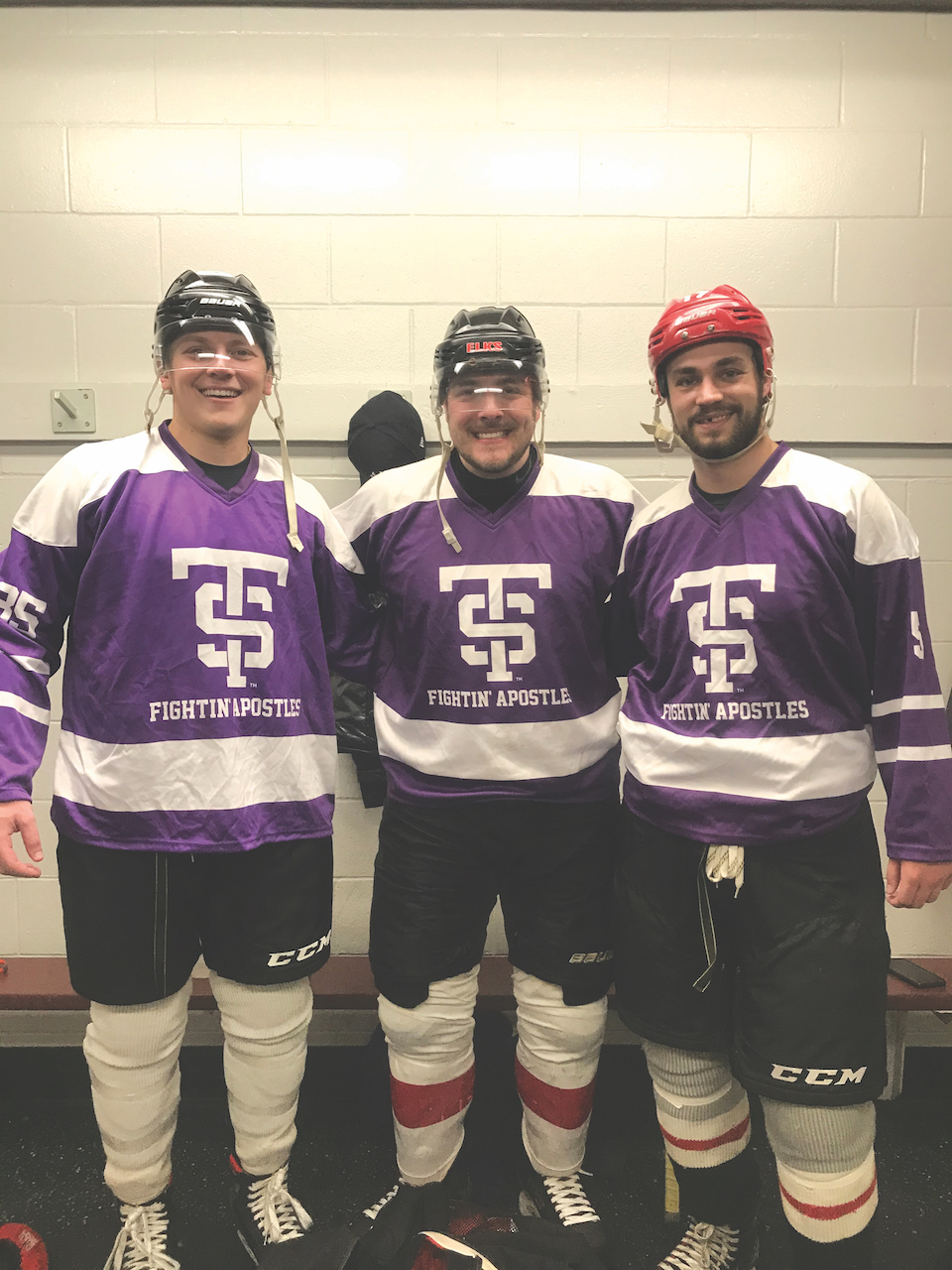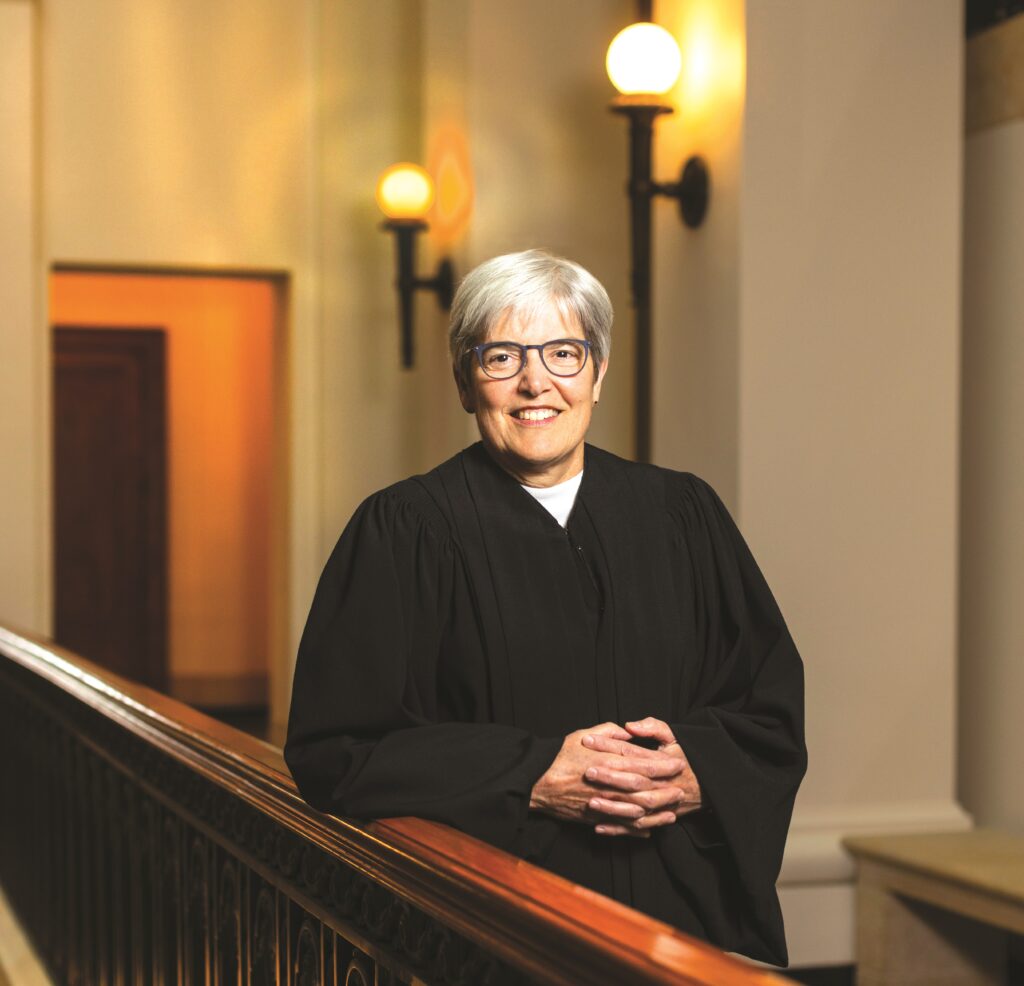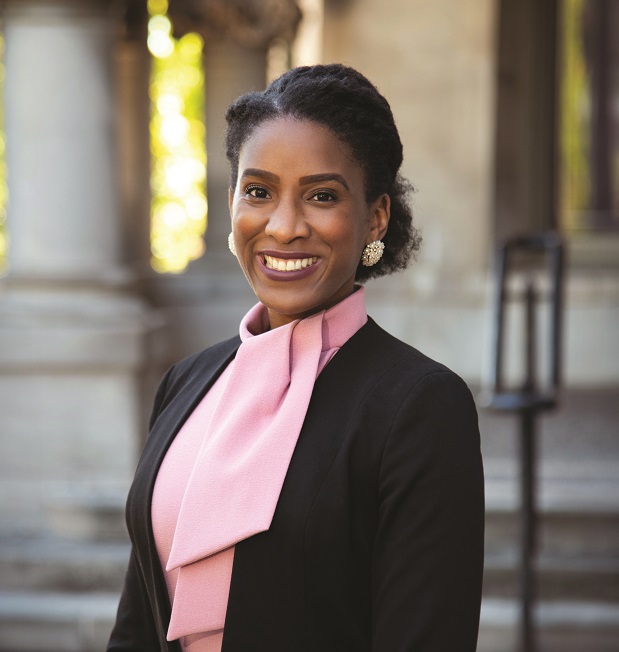When Trevor Jones ’09 J.D. was admitted to the University of St. Thomas School of Law, he thought it was missing one thing: a hockey team. As a lifelong hockey player, Jones recognized that his passion for the sport could help balance the academic rigors of law school. When Jones began his 1L year, he found he was in good company – there were enough hockey players on campus to start a team. In early winter 2006, Jones and several classmates formed the Fightin’ Apostles Hockey Team, a coed student club that has operated continuously ever since.
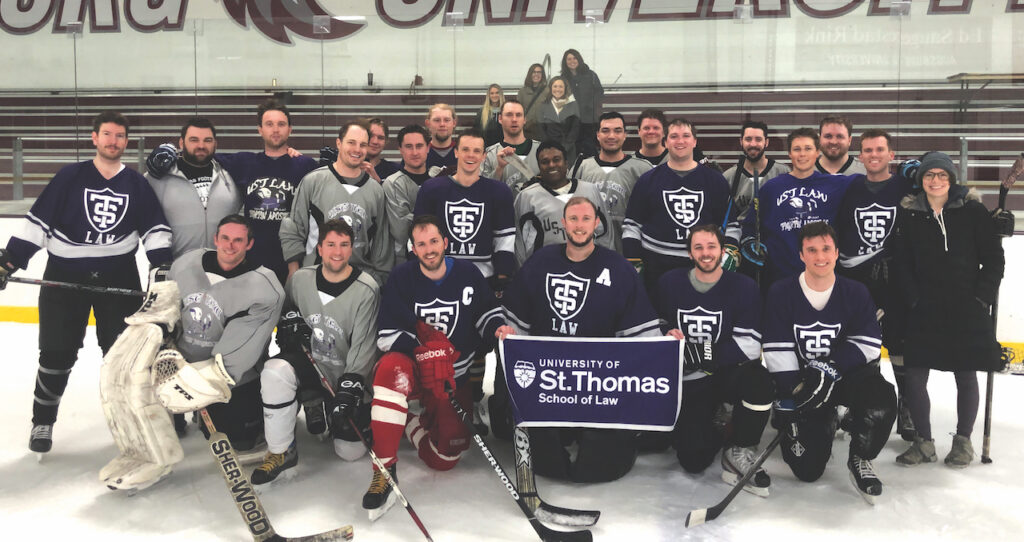
The inaugural team played in a Sunday afternoon league and established the Golden Gavel hockey tournament along with other local law schools.
“We tried to make it a team that the law school community could come and watch when we had events or bigger games – something outside of academia that the students could rally around,” Jones said.
Over time, the team also began hosting student-versus-alumni games to build community between present and past players. After nearly two decades of Fightin’ Apostles hockey, current players and alumni say that the sport offers lessons and opportunities well beyond the ice: friendships, work/life balance, community connections, professional development and more.
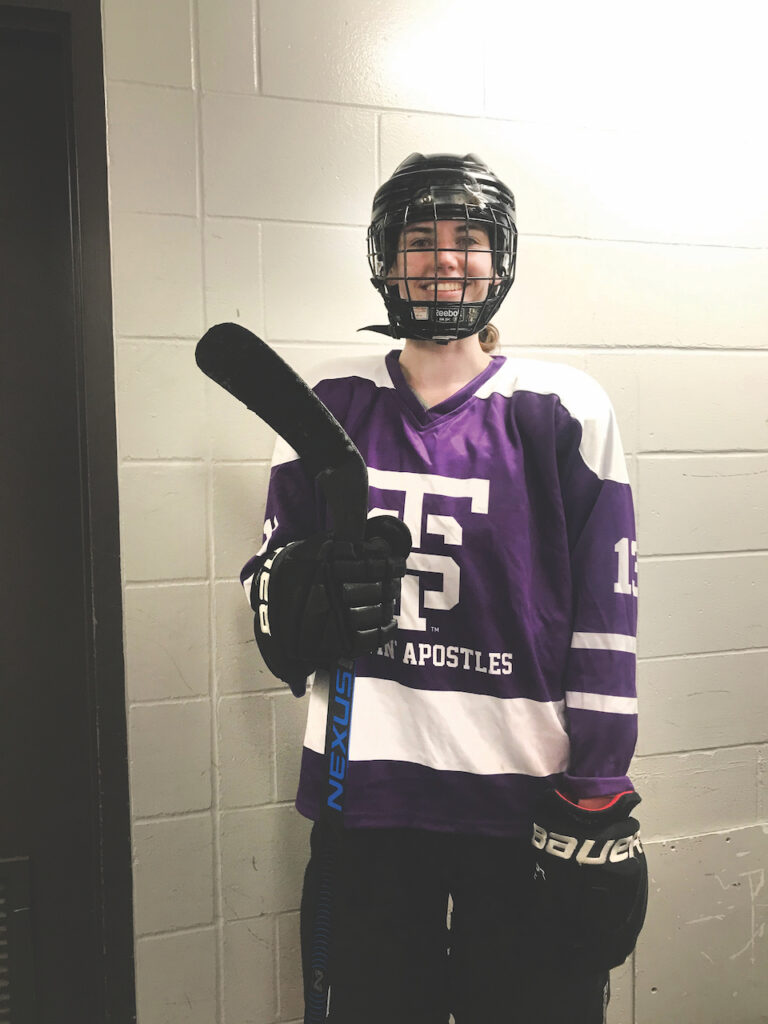
Fightin’ Apostles players resoundingly agree that the best part of playing on the team is developing relationships outside of academics and across graduating classes. For 2L Stella Haberman, playing hockey “is a great way to find balance and meet other students. We bond over the sport we love. They understand my hip and shoulder pain!”
Jones echoes, “As is true with most experiences being on a hockey team, the locker room is what I remember the most. It’s where we were able to meet new people and cultivate friendships. Even as alumni, we can meet up once a year and pick up right where we all left off.”
Josh Damberg ’17 J.D. shared a similar sentiment, “One of the best parts of playing for the team was sharing a hobby/passion with my classmates. It was a great mental escape from case law and statutes.”
Adam Brown ’06 J.D., who was in the last semester of his 3L year when the team began, recalled how that season helped him feel grounded.
“The Fightin’ Apostles team is a great way to connect with people, especially from other class years,” he said. “During law school, it gave me something familiar to do. I did not have any family or friends who were lawyers, and law school was completely new for me. I knew how to hack around on the ice, though, and it helped me feel more at home.”
Zach Graham ’18 J.D. agreed that playing provided “a great outlet and some familiarity to do something I’ve been doing my whole life when everything else in law school was so new.”
For those who grew up playing hockey in Minnesota, the so-called State of Hockey, and elsewhere, the sport fosters a deep affection for the state.
“(The team) adds a crucial part of Minnesota culture to an already strong St. Thomas Law community,” said 3L Josh Bykowski, a current team captain. “Hockey holds a special place in our culture,” commented Jones, “I feel more connected to being a Minnesotan as a hockey player.” Damberg described the team as “creating a uniquely Minnesotan social and professional network.”
That the Minnesota legal professional network has a strong hockey presence should come as no surprise.
“Hockey requires discipline, teamwork and focus,” remarked Jon Farnsworth ’07 J.D./MBA. “These skills are integral to being a successful attorney.”
Brad Walz ’04 J.D. graduated before the team was formed, but participates as an alumnus.
“Hockey taught me discipline, perseverance and loyalty,” he said. “I would do anything I could for my teammates, and I would put in the extra work so the team succeeded. Because of my hockey experience I bring the same attitude to my client relationships and the relationships with the attorneys, paralegals and other support staff in my firm.”
Hockey is a mental and physical outlet for Nate Summers ’20 J.D.
“After hours of sitting behind a computer or in a courtroom, there are few things better for my mental health than strapping on the pads and hitting the ice,” he said.
First-year law student Jill Schneider credited the sport with teaching her time management.
“I need to make time for workouts and practice, sleep, school and part-time work as well,” she said.
Third-year Bykowski learned “several valuable lessons about professionalism, work ethic and discipline” through hockey that he said have undoubtedly impacted the development of his professional identity.
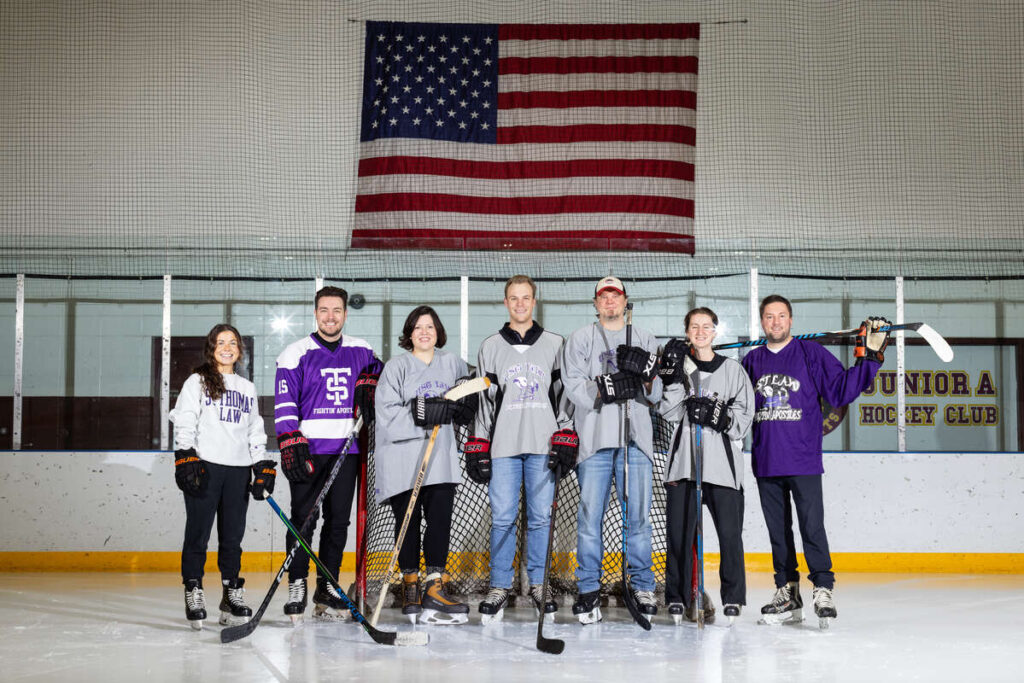
Many Fightin’ Apostles players become community hockey coaches during or after law school. Law student Haberman currently coaches a local youth hockey team with Schneider. Damberg developed a passion for coaching youth hockey in his hometown of Delano, Minnesota.
“I began coaching while I studied for the bar exam and continued once I became licensed to practice. It is an awesome way to network and give back to the community,” he said.
Damberg, an estate planner, says that he finds himself putting on his “coach hat” with clients.
“Many of my clients appreciate that I approach their planning from an educational/coaching perspective – I want them to really understand their estate plan and my process in helping them craft it.”
After a lifetime of playing and now coaching, Brown says hockey has helped to redefine success on and off the ice. When asked to explain how his mentality has changed, he talked about the hockey strategy of rotating several “shifts” of players throughout a game.
“As a younger player, I measured a good shift by whether I scored or not,” Brown said. “Let’s just say that with that mindset, I did not have many good shifts. I have learned to understand that a good shift can be defined by smaller successes such as making good passes, stopping an opportunity for the other team or maybe even backchecking hard all the way to my own defensive zone.
“Now, instead of telling myself that I had a bad shift, I tell my teammates or the kids I am coaching that ‘we had a lot of good ideas out there.’ Over the course of the game, the small successes add up and turn into more good shifts than bad ones, which leads to a good game overall. Professionally, I use this same growth-oriented mindset to stretch my abilities, push myself and learn new things.
“We all have successes every day that we need to learn to recognize and acknowledge. There will be some tough bounces along the way, but the good shifts far outweigh the bad ones, and the bad ones just become learning and improvement opportunities. Most of us could do a better job with our mindset in the legal industry. At the end of the day, stay positive and remind yourself that you had a lot of good ideas out there today!”
Hockey is much more than a game. Yes, it’s skates and sticks and pucks and nets. It’s also the comforting familiarity of the crisp smell of ice when you enter an arena lugging still-sweaty equipment; the Zamboni hum as it rolls over snowy cracks and leaves a mirrored sheen; the skate blade’s edge pulling the ice just right on a backwards crossover to pick up speed; pre-dawn practices; the buzzer blast; laughter in the locker room. It’s pushing yourself beyond physical and mental limitations, overcoming adversity, supporting teammates and working toward a common goal.
Hockey is a metaphor for life, and especially for the practice of law.
This story is featured in the spring 2023 issue of St. Thomas Lawyer.
